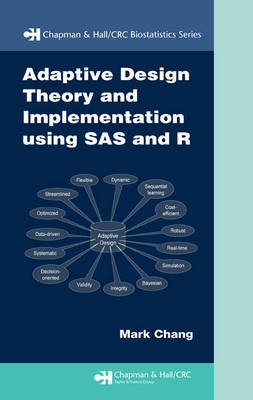
Adaptive Design Theory and Implementation Using SAS and R
Chapman & Hall/CRC (Verlag)
978-1-58488-962-5 (ISBN)
- Titel erscheint in neuer Auflage
- Artikel merken
Adaptive design has become an important tool in modern pharmaceutical research and development. Compared to a classic trial design with static features, an adaptive design allows for the modification of the characteristics of ongoing trials based on cumulative information. Adaptive designs increase the probability of success, reduce costs and the time to market, and promote accurate drug delivery to patients.
Reflecting the state of the art in adaptive design approaches, Adaptive Design Theory and Implementation Using SAS and R provides a concise, unified presentation of adaptive design theories, uses SAS and R for the design and simulation of adaptive trials, and illustrates how to master different adaptive designs through real-world examples. The book focuses on simple two-stage adaptive designs with sample size re-estimation before moving on to explore more challenging designs and issues that include drop-loser, adaptive dose-funding, biomarker-adaptive, multiple-endpoint adaptive, response-adaptive randomization, and Bayesian adaptive designs. In many of the chapters, the author compares methods and provides practical examples of the designs, including those used in oncology, cardiovascular, and inflammation trials.
Equipped with the knowledge of adaptive design presented in this book, you will be able to improve the efficiency of your trial design, thereby reducing the time and cost of drug development.
Millennium Pharmaceuticals, Cambridge, Massachusetts, USA
PREFACE
INTRODUCTION
Motivation
Adaptive Design Methods in Clinical Trials
FAQs about Adaptive Designs
Road Map
Classic Design
Overview of Drug Development
Two-Group Superiority and Noninferiority Designs
Two-Group Equivalence Trial
Dose-Response Trials
Maximum Information Design
Theory of Adaptive Design
Introduction
General Theory
Design Evaluation-Operating Characteristics
Method with Direct Combination of P-values
Method Based on Individual P-Values
Method Based on the Sum of P-Values
Method with Linear Combination of P-Values
Method with Product of P-Values
Event-Based Adaptive Design
Adaptive Design for Equivalence Trial
Method with Inverse-Normal P-values
Method with Linear Combination of Z-Scores
Lehmacher and Wassmer Method
Classic Group Sequential Method
Cui–Hung–Wang Method
Lan–DeMets Method
Fisher–Shen Method
Implementation of K-Stage Adaptive Designs
Introduction
Nonparametric Approach
Error-Spending Approach
Conditional Error Function Method
Proschan–Hunsberger Method
Denne Method
Müller–Schäfer Method
Comparison of Conditional Power
Adaptive Futility Design
Recursive Adaptive Design
P-Clud Distribution
Two-Stage Design
Error-Spending and Conditional Error Principles
Recursive Two-Stage Design
Recursive Combination Tests
Decision Function Method
Sample Size REestimation design
Opportunity
Adaptation Rules
SAS Macros for Sample Size Reesimation
Comparison of Sample Size Reesimation Methods
Analysis of Design with Sample Size Adjustment
Trial Example: Prevention of Myocardial Infarction
Multiple-Endpoint Adaptive design
Multiplicity Issues
Multiple-Endpoint Adaptive Design
Drop-Loser and Add-Arm Designs
Opportunity
Method with Week Alpha-Control
Method with Strong Alpha-Control
Application of SAS Macro for Drop-Loser Design
Biomarker-Adaptive Design
Opportunities
Design with Classifier Biomarker
Challenges in Biomarker Validation
Adaptive Design with Prognostic Biomarker
Adaptive Design with Predictive Marker
Adaptive Treatment Switching and Crossover
Treatment Switching and Crossover
Mixed Exponential Survival Model
Threshold Regression
Latent Event Time Model for Treatment Crossover
Response-Adaptive Allocation Design
Opportunities
Adaptive Design with RPW
General Response-Adaptive Randomization (RAR)
Adaptive Dose Finding design
Oncology Dose-Escalation Trial
Continual Reassessment Method (CRM)
Bayesian Adaptive Design
Introduction
Bayesian Learning Mechanism
Bayesian Basics
Trial Design
Trial Monitoring
Analysis of Data
Interpretation of Outcomes
Regulatory Perspective
Planning, Execution, Analysis, and Reporting
Validity and Integrity
Study Planning
Working with Regulatory Agency
Trial Monitoring
Analysis and Reporting
Bayesian Approach
Clinical Trial Simulation
Paradox—Debates in Adaptive Designs
My Standing Point
Decision Theory Basics
Evidence Measure
Statistical Principles
Behaviors of Statistical Principles in Adaptive Designs
Appendix A: Random Number Generation
Random Number
Uniformly Distributed Random Number
Inverse CDF Method
Acceptance-Rejection Methods
Multivariate Distribution
Appendix B: Implementing Adaptive Designs in R
Bibliography
INDEX
Summaries and Research Problems/Exercises appear at the end of each chapter.
| Erscheint lt. Verlag | 1.8.2007 |
|---|---|
| Reihe/Serie | Chapman & Hall/CRC Biostatistics Series |
| Zusatzinfo | 65 Tables, black and white; 34 Illustrations, black and white |
| Sprache | englisch |
| Maße | 156 x 234 mm |
| Gewicht | 748 g |
| Themenwelt | Mathematik / Informatik ► Mathematik |
| Technik | |
| ISBN-10 | 1-58488-962-4 / 1584889624 |
| ISBN-13 | 978-1-58488-962-5 / 9781584889625 |
| Zustand | Neuware |
| Informationen gemäß Produktsicherheitsverordnung (GPSR) | |
| Haben Sie eine Frage zum Produkt? |
aus dem Bereich



